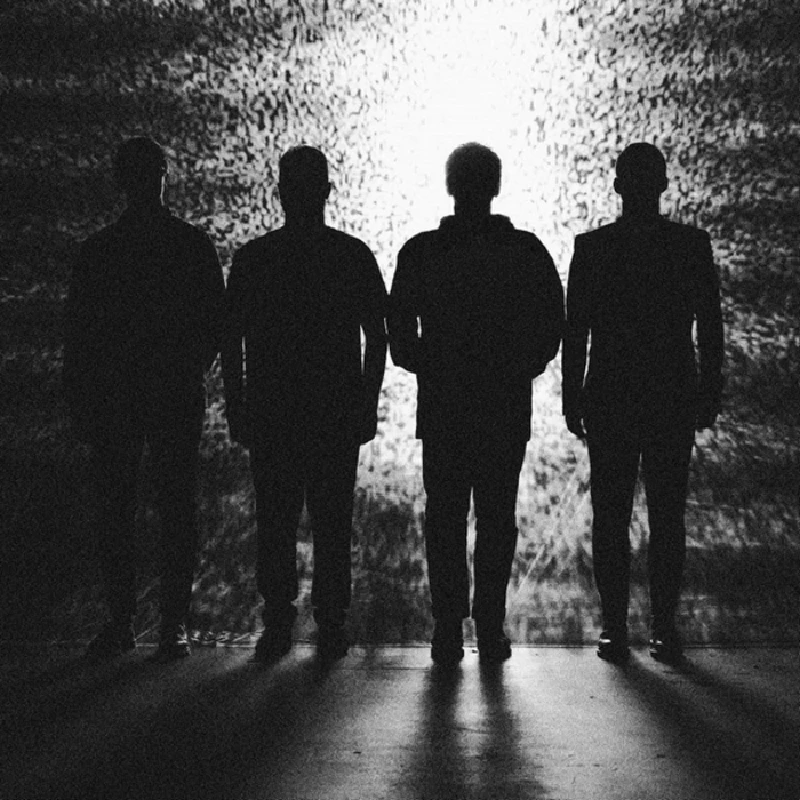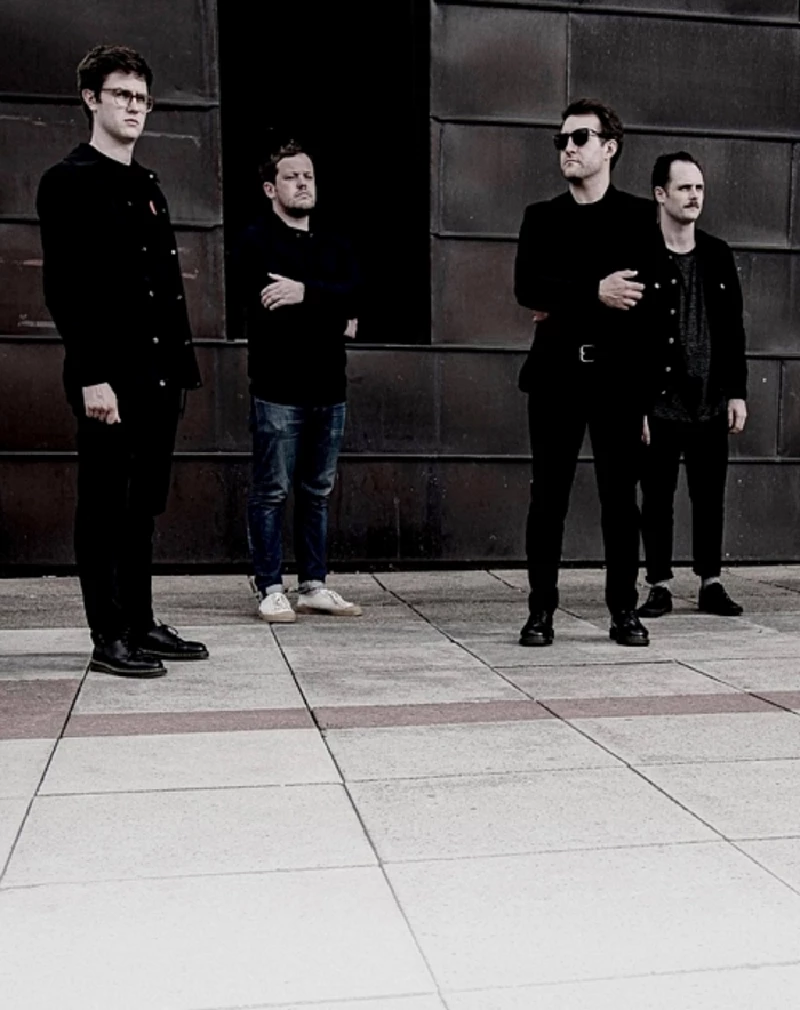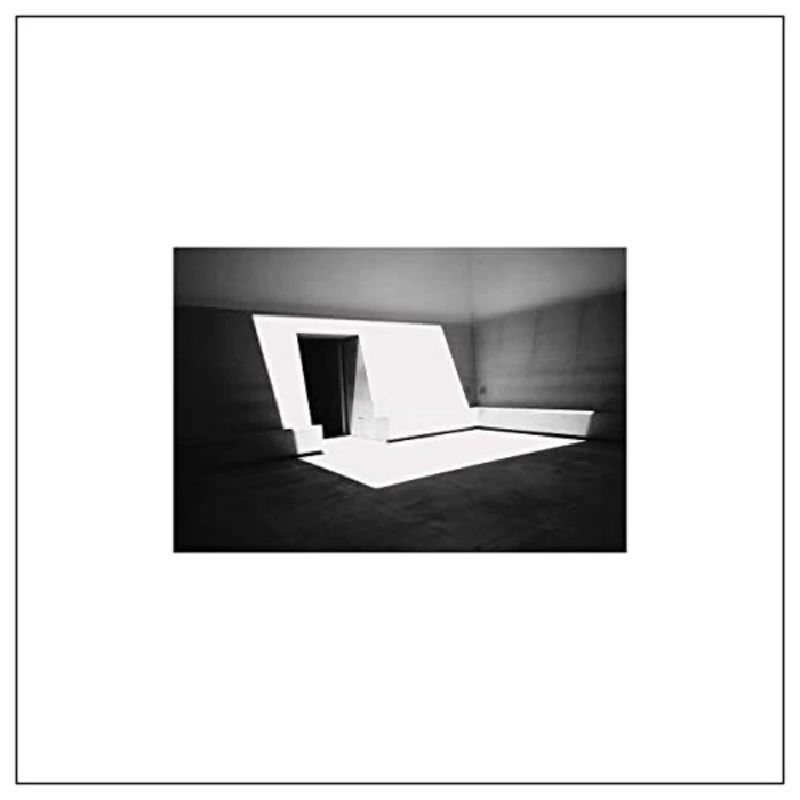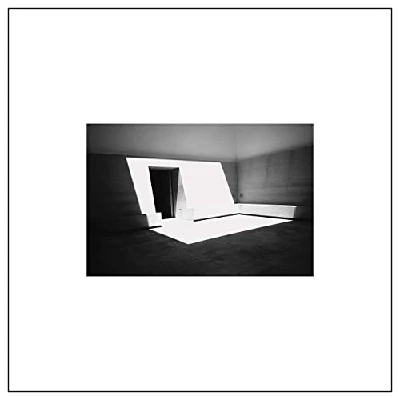Ist Ist - Interview
by Adrian Janes
published: 9 / 9 / 2020

intro
Andy Keating of Manchester's Ist Ist talks to Adrian Janes about the band's influences, music and future.
What will surely prove to be one of the outstanding albums of 2020 - 'Architecture' - was released in May by Manchester band Ist Ist. A work full of brooding power, it follows the series of singles and EPs that they have been putting out since 2016. The fact that the band haven't rushed into making their full-scale debut but have waited until now is symptomatic of an attitude that extends to both their sound and their visuals, an intriguing balance of thoughtfulness and passion. These same qualities are very much in evidence in bassist Andy Keating's reflections on such matters as the place of Manchester in Ist Ist's influences, the ideas behind 'Architecture' and the creation of their videos. Given the determination and patience that has got them this far, it's unsurprising that they are already looking ahead to making fresh music and the hope of performing live again. It has often been said that you can no more write about music than you can dance about architecture, but in Ist Ist's case you can certainly at least listen to it with great reward. Pennyblackmusic: Let's start with some basic history of the band. What drew you together in the first place? What significance does your name have? Andy Keating: Adam and I go way back, we'd played in bands on and off since 2007 and knew Joel from around the scene at that time but we'd never been in the same band. Mat joined in 2018 after we'd toured our first EP. We were beginning to reach the limits of what we felt we could achieve as a three-piece and wanted to stretch our sound and capabilities as a band. Mat coming in transformed things for us, and suddenly there were so many different avenues for us to explore sonically and dynamically. The name comes from Das Ist, which we were originally going to call ourselves. It sounded a bit too industrial though and we went for Ist Ist, which doesn't mean anything as such but we liked the repetitive percussive sound of it. PB: Given Manchester's rich musical history, do you find it an inspiration or a burden? Or do you think it's not a factor at all, that you'd make the music you do whereever you were? AK: I think on balance it's marginally an inspiration but it's also a burden because you're instantly compared to bands like Joy Division and New Order, which is unfair and essentially irrelevant to what we're doing. Yet that is a factor in terms of the influence. I'd like to think we'd sound the way we do regardless of where we came from, but the fact we're from Manchester probably dictates what we grew up listening to in some regard. That's not to say we were all exclusively raised on Factory Records, far from it, but you naturally take an interest in local success stories. Would we sound more like The Strokes, Yeah Yeah Yeahs and Jonathan Fire*Eater if we came from New York? I think so. PB: With the succession of your singles and EPs since 2014, there seems to have been a considered progression on your part. Is that an accurate impression, or has it all been much more haphazard? AK: Nothing we've done for at least the last three years has been haphazard or off-the-cuff. We've been very meticulous with our approach to sound, release strategies, image and tour schedules. We've been in the game long enough, we're not a very young band and we know what we want and we have a good idea of how to get there, I think. Everything we've done since our debut EP 'Spinning Rooms' has been deliberate and it's served us well. Whatever follows 'Architecture' will be equally considered. The enforced break from playing live has been beneficial in the sense that it's given us time to breathe, to write and to be able to look even further down the line than we usually would do. PB: Who do you feel you are influenced by, whether from today or the past? AK: It's a real melting pot of influences. There's the obvious ones like Interpol, Joy Division and The National, but we like rock music too: Led Zeppelin and Black Sabbath. Pixies and Nirvana as well, we always talk about the classic 'quiet verse loud chorus' Pixies approach to songwriting which we fucking love and you'll hear a lot of in our songs. People don't instantly dig deeper and think or ask where that sort of thing comes from. You wouldn't instantly put us in the same bracket as The Pixies but the influence is huge. We love The Killers' approach to structures. Some of their songs don't follow the usual progressions even though they're a huge chart success, some of their songs go verse, chorus, verse, then a sort of hybrid chorus and outro. People regularly blur 'influenced by' and 'sounds like' which can be detrimental, there are so many layers to songwriting that you can sound nothing like your main influence. PB: You've described 'Architecture' as being concerned with "the architecture of the mind". What are a couple of examples that crystallise that idea for you? AK: Whilst it's not a concept album, there is a general theme which runs throughout. 'Wolves' is about the paranoia of a mother who is afraid of her children being taken away from her, 'Night's Arm' revolves around an irrational fear of darkness and death, and 'Slowly We Escape' is written from the perspective of both sides of a doomed relationship. It doesn't focus entirely on real-life situations, more on thoughts, feelings and insecurities. PB: In 'Under Your Skin', there are several references to a mysterious committee which suggest some sort of dystopian world. Did you have a specific organisation in mind, or do you prefer to leave it open to interpretation? AK: A lot of our songs are left open for the listener to interpret how they want, which we feel is a good thing. This song in particular was more about higher powers, whether that be people calling the shots at work or just someone or something unseen controlling your life. PB: One distinctive way you've promoted the album has been by creating a video for each track. What has influenced the aesthetic of these films? Were they made by yourselves alone, or do you have creative partners? AK: Similar to the approach to the album, we didn't want there to be an overriding concept with the videos, more just a general vibe and theme running throughout them. We didn't want a linear story because the album isn't linear in that sense. We thought it was a bold approach to release a video for each track from the record, we've never seen a band do that before and with it being our debut album, we wanted to make a bit of a splash and do something innovative with it. The videos have all been directed by Matthew Boone and our friends at the Scruff of the Neck Creative Team. PB: The musical scene in the UK is probably more fragmented than it's ever been. Do you think in some way that reflects a more general psychological and social fragmentation? AK: It definitely reflects social differences. There's a fine line between subcultures and fragmentation. Subcultures are on the whole good and are necessary: if everyone liked the same arts and the same music, we'd be in a boring and blinkered place. Fragmentation almost implies division which can be explosive and I've never personally seen hurtful division in the music scene. Do I think some of the music around today is shit? Yes. Do some people think our music is shit? I'm sure they do. But that sort of thing has been around forever, and as long as it doesn't spill over into animosity then it's cool. PB: With the kind of songs you write and their intense delivery, you're likely to be categorised as 'post-punk'. Yet that is now a category that's at least forty years old. Is it helpful or relevant at all to you in 2020? AK: Categories are helpful for people who like to categorise things. Some people like to have particular compartments in their minds where they put particular bands. That's fine, but we don't necessarily find that conducive. At least categories and labels give new listeners a general overview of what we might sound like, but it does narrow your potential market somewhat. We always feel like approaching things with an open mind is the best way, but it's understandable why people like to pigeonhole things, especially in the day and age of algorithms on streaming platforms such as Spotify which actively categorise bands to push to potentially-interested listeners. PB: Obviously you would have been hoping to promote these powerful songs live. Since that's not yet possible, in the meantime are you able to work up new material? Might you be releasing new tracks before you play live again? AK: We've been writing new music with a view to recording our second album later this year, what else is there to do? Whether that gets released before we go and tour 'Architecture' is hard to say. The intention is to give our debut album the respect we feel it deserves, and in an ideal world we'll tour the album then look at releasing the second one, but that's all dependent on how long we can't gig for. If venues can't open for full-capacity shows within a year to eighteen months of being forced to close, I dread to think of what it'll mean for the industry and what the wider implications of those restrictions are. Pretty much every industry which relies on people congregating will cease to exist. The world will be unrecognisable. Back on to our music specifically, put succinctly, we're not running short of ideas and we feel the new music is stronger and more progressive than anything we've done before. We're excited about it and it doesn't seem like we're going to struggle with the notion of a 'difficult second album.' PB: Thank you very much.
Band Links:-
https://www.facebook.com/ististmusic/https://twitter.com/ististmusic
https://www.musicglue.com/ististmusic
Picture Gallery:-


reviews |
|
Architecture (2020) |

|
| Strong debut album from post-punk Mancunians Ist Ist, who while they have Joy Division in their DNA reveal themselves to be no clones |
most viewed articles
current edition
Tossing Seed - InterviewMotorcycle Boy - Interview
Last of the Lovely Days - Interview
Waterboys - Roundhouse, London, 1/6/2025
Lemonheads - O2 Ritz, Manchester, 16/8/2025
Cary Baker - Down on the Corner: Adventures in Busking and Street Music
Robert Forster - Interview
Brian Wilson - 1942-2025
Morrissey - Photoscapes
Belouis Some - Video Vault
previous editions
Flip Side - Raging PagesBob Mould - Brooklyn Bowl, O2 Academy, London, 11/2/2016
Dave Greenfield - 1949-2020
That Petrol Emotion - That Petrol Emotion, Town and Country Club, London, 1988
Stereogram Revue - Voodoo Rooms, Edinburgh, 2/12.2015
Bill Hicks - Profile
School - Interview
John Clarkson - A Life in Music
Ain't That Always The Way - Alan Horne After The Sound of Young Scotland 2
Miscellaneous - Minehead, Somerset, 8/5/2009...10/5/2009
most viewed reviews
current edition
Liarbilitys - VandalheartKirk Adams and Ed Woltil - Eat The Sunshine, Drink The Starshine
Big Flame - Peel Sessions 84-86
Silver Biplanes - Coming Up For Air
Wolf Alice - The Clearing
Suzie Ungerleider - Among The Evergreens
Bruce Dickinson - More Balls to Picasso
Good Charlotte - Motel du Cap
Rupert Wates - Father to the Man
Phew, Erika Kobayashi,, Dieter Moebius - Radium Girls
Pennyblackmusic Regular Contributors
Adrian Janes
Amanda J. Window
Andrew Twambley
Anthony Dhanendran
Benjamin Howarth
Cila Warncke
Daniel Cressey
Darren Aston
Dastardly
Dave Goodwin
Denzil Watson
Dominic B. Simpson
Eoghan Lyng
Fiona Hutchings
Harry Sherriff
Helen Tipping
Jamie Rowland
John Clarkson
Julie Cruickshank
Kimberly Bright
Lisa Torem
Maarten Schiethart